“We’re The Only Plane In The Sky”
As we approach the fifteenth anniversary of the September 11th attacks on Sunday, Politico is up with a fascinating first-person account of the attack from the point of view of White House aides, military officers, and members of the traveling press corps who were with President Bush the day everything changed. It follows the story from the early morning hours of September 11th in Florida right up until the President’s return to Washington that evening to address the nation from the Oval Office. It’s far too long and detailed to excerpt, so I’ll just recommend you read it because it tells a part of the story of that day that we’ve never really heard before.
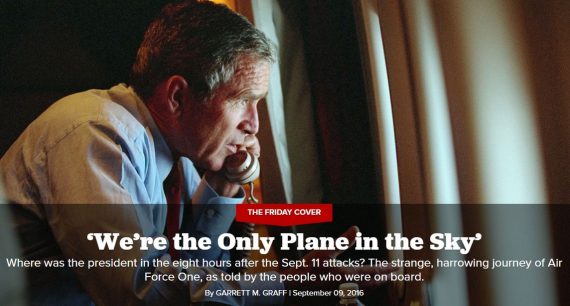

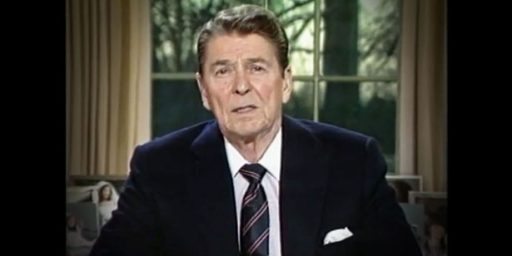

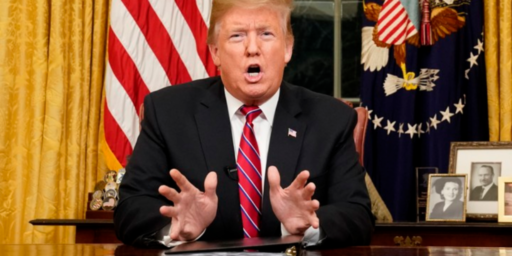
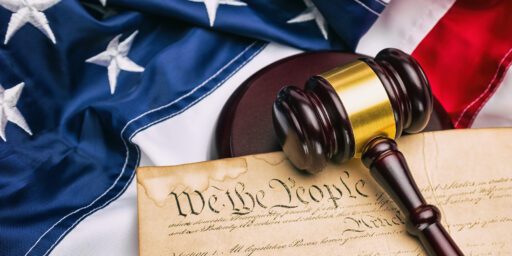
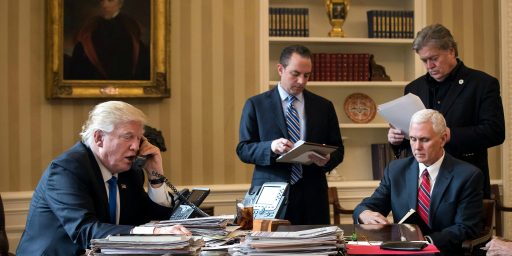
Interesting. My recollection of those first couple of days seems to be different from everyone else’s and I would like to see some corroboration or refutation.
My recollection: Bush let himself be shuttled around by the Secret Service and barely reached out directly to the American people or the world. His administration dumped press releases, and Cheney seemed to be taking charge, but Bush himself made some cursory statements and stayed in hiding.
Maybe I’m wrong, but that’s how I remember it.
Thanks for the link. H/T to Politico for that quote as a title- Hearing of the FAA order to ground all aircraft (MEDEVAC flights continued) was nearly as much of a blow as anything else that day. Radar screenshots of emptying skies were also impressive.
@MarkedMan:
Bush was back in Washington by the evening of 9/11 and addressed the nation in prime time that night. I seem to recall him visiting the Pentagon within a day or two after the attack, and he was in New York City the Friday of that week, that’s where this photo, and the “bullhorn speech” occurred.
@MarkedMan:
GWB addressed the country on TV on the night of 9/11.
Spoke at the National Cathedral on 9/14.
Went to the WTC on 9/14.
@MarkedMan:
It’s my understanding that when it comes to POTUS’s safety, POTUS doesn’t have a say in the matter..
Just finished the article. Very, very good.
Good lord the banality and crap:
What struck me was as soon as he hung up the phone, he said, “I was an Air National Guard pilot—I’d be one of the people getting this order. I can’t imagine getting this order.” There was a greater degree of reality than many other presidents would have experienced.
Karl Rove: He was so even-handed. He was just so naturally calm during the day.
In reality they were already trying to make the connection with Iraq and in a year these idiots would be avid believers in Curveball and Ahmed Chalabi. They can’t mention the truth so all they have are these Hallmark memories of sobriety and concern, none of which rise above the level of Eishenhower’s bowel movements.
@Doug Mataconis: @Fausta: OK? So he only putzed around for a day?
@gVOR08:
Because the Secret Service could not guarantee his safety if they returned to Washington and they have the final say in those matters.
I do remember that he released a short statement. But my recollection is that we heard much more from Cheney than Bush in the first 2 days. I don’t care whether or not he returned to DC, the lack of leadership seemed apparent to me at the time and he doesn’t need SS approval to communicate directly from wherever he was at. I would expect the president to be a regular and calming presence during those several days between 9/11 and 9/14, the most critical days. My recollection is that he was not.
Given the above quote, I guess this book is some kind of hagiography and probably wouldn’t answer my questions. Maybe I’ll google around a bit this weekend and see if I can put together my own timeline.
@Doug Mataconis:
Please. What nonsense. The Cossacks work for the Czar. The Secret Service is ultimately under the authority of the Secretary of the Treasury, who serves at the pleasure of the President. They’re not some Praetorian Guard who can order the president around at their whim.
@Doug Mataconis:
Show me where in the Constitution or any federal codes or regulations it says that the president is subordinate to the Secret Service. I’ll wait.
@Rafer Janders:
@Gavrilo:
You don’t actually know how to read, do you? The above does not say what you think it does.
@Rafer Janders:
Also, since 2003, the Secret Service reports to the Director of Homeland Security, not the Treasury Secretary. But, please regale us with more of your expertise about the Secret Service!
@Rafer Janders:
Under 18 U.S.C. 3056, Secret Service has the total support of the federal law to regulate the protection of the President of the United States. The President of the United States, like all Citizens, has to follow the law, insert Hillary joke here.
In the event POTUS didn’t like how the secret service handled his or her security during an incident, they could use their position as the ‘boss’ of the Secretary of Homeland Security to direct them to, I dunno, fire all the secret service agents that displeased them, but that would only occur after said security incident was complete.
Or, in other words, @Gavrilo is correct here.
The wait is over!
@Neil Hudelson:
Again, no, the wait is not over, and Gavrilo and you are not correct. 18 U.S.C. 3056 authorizes the Secret Service as the protective entity that guards the President. Nowhere in there, however, does it say that the Secret Service can issue orders or commands to the President that he has to obey, that he is subordinate to their authority. Read it more closely again and see if you can find such a line.
No, in the event that the President didn’t like how the SS handled security, he could immediately order them to stop. The chain of command runs up, not down. Otherwise we could get into a situation where the agents could decide that there was a security situation that required them to hold the president out of site at a remote cabin in the Rockies for a year, and he would have to go along….?
Of course we heard more from the Dickster Cheney, After all, he was in the White House situation room participating in a NORAD war game simulation where terrorists fly planes into buildings doh!!!!
Coincidence or ????I am not making that up.
@Rafer Janders:
From the code:
The secret service is charged with keeping the President safe and are the ones who assess the physical safety of the President in any situation. The President cannot decline that. It is not the same as being “subordinate,” and I think you know that’s not what’s implied by this. If the environment the Secret Service placed the President in interfered with POTUS’s ability to effectively be CinC, I imagine there is a statute that addresses this, but frankly I’m off the clock now. (Easier to look up code when you work in an office with 12 lawyers and you.)
I don’t believe this is how the law works. Lawyers, please correct me if this is the case. Again, the law authorizes the Secret Service to ensure the safety of POTUS, and carries the full weight and authority of federal law The POTUS has to follow the law unless there is a specific legal exemption. Your entire arugment(s) kind of smacks of ideas that POTUS is a Supreme Authority over all federal employees.
How about this–please provide the specific law that authorizes POTUS to undermine the Secret Service’s security protocols. I do not see it here.
No, that would be kidnapping. Or are you seriously expecting me to address a slippery slope argument? Secret Service is authorized to discharge their weapons in protecting POTUS, however that doesn’t authorize them to immediately open fire on anyone they suspect of harboring ill will towards POTUS. In the same way they are authorized to ensure the safety of POTUS, but not kidnap him for sh!ts and giggles.
@Rafer Janders:
According to the statute, Secret Service protection for the President is mandatory. So, no. The President can’t order them to stop protecting him. Were he to, he would be in violation of the law. Now, what constitutes an acceptable level of protection is a gray area, so the President’s staff and the Secret Service try to strike a balance between his security and what he needs to do as President. In any event, criticizing President Bush for not immediately flying back to Washington on 9/11, when there were still lots of planes in the air and when the White House was a possible target of the 4th plane is incredibly lame.
@Neil Hudelson:
Chain of command is paramount unless superseded by an order from a superior officer to the chain of command.
– The President is always the most senior officer in any chain of command.
Chain of command is paramount unless it pertains to an illegal order.
– The President countermanding his protection detail is not issuing an illegal order.
——
@Gavrilo:
While protecting the President is mandatory according to the statute, where and how is up to the discretion of the protecting detail, which then makes the where and how open to the discretion of the senior person onsite. i.e. the President.
@Rafer Janders: It was probably not the Secret Service calling the orders. It was a more powerful group that was directing every move the president and his inner cabinet made during those days and weeks. The words he spoke to the nation and his staff were carefully chose, filtered. No movement was left to chance.
@Doug Mataconis: Possibly things have changed, but on November 22, 1963, the Secret Service wanted President Johnson to return to Washington immediately, but LBJ refused to leave Dallas until Mrs. Kennedy and the body of President Kennedy were aboard Air Force One. Whether or not the Secret Service overruled the President, Bush was visibly jittery and indecisive on 9/11. As I recall, Karl Rove put out the story that Bush had wanted to return to Washington at once, but was deterred because of telephoned threats to shoot down AF1 (a cover story that quickly fell apart).
@Tyrell:
I think you need a new tinfoil hat
@SC_Birdflyte:
Read the article the consensus among all parties was that it was better to keep the National Command Authority, in the person of the President, airborne and on the move due to the unknown nature of the threat that was facing the nation that day. The President, according to all accounts, reluctantly agreed with this consensus and in any case was in contact with authorities in the military and at the White House bunker at all times. Had the technology existed at the time, which apparently it did not, I’m sure they would have attempted a brief address to the nation from Air Force One even if it was only by telephone, but apparently that wasn’t possible.
In any case, your criticism seems rather pedantic at this point. I’ve been critical of President Bush for many reasons, but his leadership in the days, weeks, and months after 9/11 were a model for future Presidents facing similar crises. If you disagree that’s your privilege but I’m done arguing over a minor point like what time Bush got back to Washington that day.
@Gavrilo: “According to the statute, Secret Service protection for the President is mandatory. So, no. The President can’t order them to stop protecting him. ”
Please note that ‘protecting’ and ‘controlling the movements of’ are not actually the same thing.
So I did spend some time on the Google this weekend and found that Bush addressed the public 3 times on 9/11: once from the school where he learned of the attack, once a few hours later via a taped message and then the speech in the evening. That was more than I remembered. My impression at the time was that his actions projected timidity and indecision until he finally pulled himself together for the bullhorn speech. Over the years it seems I’ve back projected that to minimize Bush’s actions.
@Doug Mataconis: You miss the main point, which was that Bush was not in control that day until after he returned to Washington. Yet only a few days later, photos started showing up in my e-mail from diehard GOP friends; they showed Bush and Andrew Card calmly discussing matters aboard AF1 on his cross-country trek, thereby giving the impression that the President had fully taken over. Besides which, if the President’s ability to tie into the military command structure had been a governing consideration, MacDill Air Force Base (Headquarters of CENTCOM) was less than 50 air miles from Sarasota. If the military and the Secret Service couldn’t have provided security for the President on a major military base, keeping AF1 in the air was unlikely to provide much of a benefit.